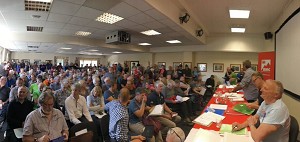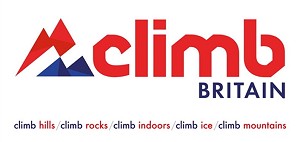
Earlier this week, BMC CEO Paul Ratcliffe joined us for an interview following his announcement of a £650,000 loss in the 2023 financial year (UKC News).
Paul took up his position in February 2024 and we caught up with him to hear about how he plans to tackle this latest bad news, along with other systemic issues at the organisation.
Read a transcript of the interview below:
Rob Greenwood: Today we have with us Paul Ratcliffe, CEO of the BMC. Paul, when we first arranged to do this interview, it was maybe a month ago now. The idea was that we were going to give you the platform to introduce yourself, talk a bit about your background, and maybe how those first few weeks were at the BMC and what your plans were for the weeks ahead. And of course, there's been a slight change of plan because last week, the audit was released announcing a deficit for 2023 of £625,000 pounds, which sounds like a lot of money - and so that potentially changes things a little in terms of the direction we take, but I still think it's worth starting with how those first few months have gone. You started just at the beginning of this year. When you came into the BMC, what were your initial impressions of the organisation and the work that you had to do?
Paul Ratcliffe: Yeah, it feels quite a long time ago that I was sat in the pub in Grindleford before the Peak Area meeting. If I look back on the 5th of February, my plan when I started was really to build a lot of engagement with the community, to really understand the finances and get a grip of it and number three, to galvanise the team internally and to start to build a team during that first three months.
The starting point as I understood it with the finances, we were probably at around a £280k loss, which was significant in itself, but it felt doable and to move reserves to around £600k by the end of the year. And then the last three weeks as we got towards the final stages of the audit, to find out then that we're at a £625k loss put a different perspective on it. But being a competitor used to sitting on the start line and starting from zero every single time, it just sort of resets the starting point for me and it's about working towards a different marker for the longer-term scores.
I can imagine that when you started as I said back in February, you were almost expecting one thing, you've got an uphill struggle with the deficit that was anticipated at the time. And then obviously, when the news came through about that audit, realising that the hill maybe was significantly steeper, how would you go about rectifying that because that's got to be one of the key issues now for the foreseeable future hasn't it - balancing the books?
Yeah, well, step one is really understanding it. Once you've understood it, it's then 'what you can do about it?' So just to be clear to all your readers, number one was a misunderstanding of how the grants operated and misbudgeting them. It sounds really difficult to understand how that's come about - and that's probably traced years back in terms of how the UK Sport grants are understood. So step one is to get clarity on that and what it means to operate them within the budget and the means to do that.
Step two is reconciliation of inaccuracies in VAT, which was around £61k. We're going to have an internal VAT audit now to look at the last few years to see if there's any other changes that need to be made.
Number three is contract management. We have £52k of overspend because of mismanagement of contracts and bad debtors, so it's about doing things in the right way. If we're setting up contracts, how are they monitored, how are they reviewed, how are they established? And the insurance last year was a critical one, you'll have seen this year as well we had another one where from the first of November last year, noone was in the FCA until I was put on so I had to pause insurance which costed us another £18k. So it's about getting proactive in these things and getting proper business ways of working in place now.
And the last one you would have seen - the term 'course correction', which I'm not a fan of. Redundancies, people leaving, restructuring was a significant one at £115k. So it's getting all these in shipshape and having a budget that we can operate to that's within our means now.
One of the things that came out of the open forum meeting last night was the importance of having a head of Finance and Operations to work with you to, as you say, to get the books balanced, the books in shape. Now what's the timeline for that?
Yeah, so step one for me is - we've had some challenges within the finance team, which I think's been documented and we've been short of staff. So I'm very grateful for UK Sport in advising me in terms of somebody who's best in the system. So we've contracted support in financially from a different sport that's going to take us through a different process and a different way of setting up our budgets and monitoring our budget. So hopefully this stands us in good stead for the for the longer term. And then during this phase, we look to go and recruit a head of finance and operations which is in place for the back end of the summer. I need to make sure we can fit these roles within the budget or not spend money that we've not got at this moment in time.
I think this is an awkward question, because people always want to apportion blame. Basically, who is to blame: is it the board. We're obviously sitting here with you. You started in February, Paul Davies, your predecessor and the CFO as well have both gone. You described, I think, a 'systematic failure' or bad management. What are your views on blame and who is, for instance, left on the board and what they should do?
So my personal philosophy is you never attach blame to people. I think there's always got to be a collective responsibility. And I think it was the phrase 'systemic failures' and you trace it all the way back from how the contracts were set up with UK Sport and how the grants were established to then how the budgets had been set each year to the budget controls. So there's got to be a collective responsibility for those things. And I know it sounds awful, but you can only ever learn and put systems in place to improve and that's where I'm coming in now. And I'm very fortunate - I think I've got a board who are good advisors to me, it's a collective approach, they're good sounding boards and they want to make a difference and they want to make a change from here on as they've been trying to do over the last 12-18 months as well.
One of the perceived areas of overspend - I think this is also rooted in reality - is in GB Climbing. Could you tell a bit about how that team has maybe swelled in recent years and what measures have been taken in place to rein that back in?
Yeah, first of all, I'm fortunate to work with some brilliant staff and brilliant, brilliant coaches in GB climbing, and I think we're in a position where actually performances can grow and the system can grow. I think looking back it perhaps grew a little bit too quickly and in a budget that wasn't there to sustain the amount of staff and the Performance Centre Unit E and you'll have seen publicly, we had 4.6 roles that have left since the end of 2023 and with the Unit E Performance Centre, that gives you an indication that we're probably running at circa £200k over the budget. So it's a very difficult situation. So my first step is to get the grants in line to reduce the impact on membership money coming in and we have to operate within our means, within the grant. That's meant difficult decisions for athletes, for coaches in terms of what we can do and what we can't do.
So you've come from a canoeing background and you were Head of Performance at British Canoeing. British Canoeing is different from the BMC in many ways, but one of them is that it stemmed from a 'supporting athletes' perspective and later moved into access, whereas the BMC is rooted within access and obviously recently came into - well, relatively recently came into - the competition side of things. What are the differences between the two organisations from your experience?
British Canoeing started in 1936. It was set up for competition, for the Olympic Games, and it's then carried on that tradition, but it's moved into access and participation, whereas the BMC started as a representative body in 1944 and it's grown into this competition phase. So I think both are probably crossing over. You have to learn to move with the times and deal with the modern way, I think, of doing things. British Canoeing is probably grappling with a reduction in members on the competition pathway, whereas we're looking at how we expand and grow that side of things as an entry into into the sports that we love. It doesn't mean if someone's coming into the competition side that they don't go and enjoy a lifelong love of climbing. So I think for me those two crossovers where everybody's loving what they do and enjoying what they do, as an organisation I think we've got a huge role to play in amplifying all the different strategies and parts and parcel of what is the broad church of the BMC. We've probably just not quite found the way of handling that yet within the BMC but I hope over the longer term we can be much better for GB Climbing - part of it and better together.
Something else that was raised in the Open Forum last night was about any knock-on effects to the athletes as well as a result of the decrease in staff within GB climbing. Have you got anything to say to reassure either athletes or parents of athletes?
I think the funding territory is always really tough, and we're probably not the only sport that would receive reductions in funding this year. So my take is we can only be honest and open and I think it's better to say what we can do rather than say something that we think we can do, but we can't. So I think as long as we all start from that basis with athletes and coaches, then that's the way we need to operate. And I'm also a fan of, no matter what, we have an 'earn everything' philosophy and when I talk about that, I mean, you've still got to put yourselves on the start line, bottom of the climb and go and earn your route into an event through selection into the teams.
And so that's the fundamental basis and we add value then with training camps, with the competitions, with the coaches to the best of our ability. That's the starting point. So for me it's trying to do the basics really well with good quality coaching, good camps, but not saying what we can't do. The last thing I want to do now is spend members' money in an area that BMC have backed usually but we can't do to the extent that we've got.
A more social question, Paul, but ahead of the Olympics later this year - you're an Olympian as well. Erin McNeice coming third, getting bronze in the Olympic Qualifier Series just last weekend. What are your thoughts ahead of Paris 2024?
Well, I think full credit to all the community coaches, all our coaches and staff for trying to galvanise and move the team forward because we've got all the challenges they've got going on behind the scenes, but for the young athletes, we don't want any of this to impact them. And so of the results that we've seen, I think it's incredible. So with Hamish and Erin recently, we don't want to put any pressure on them, we just want them to do their best at the next OQS. We've also got Molly who's pretty close as well. Yeah, I just want to back them all the way and support them to best of our ability and hopefully they can go and do the business for us.
We're talking about the Olympics on one hand, and then we talk about, say access or we talk about clubs. I think the phrase you used within the Open Meeting was that we all 'lean in a bit'. How would you keep all of those differing parties happy when they have such different sets of needs?
Well, the first step for me has been listening and understanding all of those things. So I was with the Climbers' Club yesterday and it's about "OK, you could do these things better for us in this sort of way." I think it's about catching all these things over this next three to six months and moving into areas that we can do better in within the resources we've obviously got. So that's been the first step for me, just making sure we're listening, we're taking feedback on board and then taking some actions to move these things in a different place.
But with any strategy, some things get amplified or dialled up a bit more than others and perhaps what we don't shout about enough is our work in some of the areas that we know members want to see. So access - we're stronger in that area. We're doing more this year, we've strengthened the team, but we can do better at shouting about these areas. And we're also incredibly grateful for the support that we get from members in donating into ACT (Access and Conservation Trust). We had bad news last week, but we had donations come in to our climate project because of some of that and that enables us to do more work. Some of our partners from Sport England are recognising that as well. And we've got Chris Baldwin paying us a visit with Moors for the Future on 16 July to showcase some of the good work that we are doing. Yeah, I think it's about getting that right and getting our publicity and marketing right around it.
And in terms of membership, what's the direction of travel at the moment? Is it an upwards direction, downwards direction or is it sort of plateauing?
So in terms of clubs we're growing, I think we're probably around 336 and then in terms of individual members, we're probably down around 800 on the year so far, but for me, given the climate we've been operating in and some of the cultural issues we've had I think we're pretty stable compared to a few other sports that have lost more members given the cost of living crisis. I think our first job is to actually take better care of the members that we've got.
What would you say as well to those who maybe have cancelled or at least put on hold their membership for the time being? What would you say to them to bring them back into the organisation?
We've had so many emails even over the last week, either positive ones or negative, cancelling; we're following up with each one of them individually. So our Head of Membership, Arun, has been with us for 20 years. What we're doing is the personal touch, customer service. Finding out why, talking about the good stuff that we're doing, giving them a door back in. So no matter what, we're treating them as people, using a people-first philosophy; putting members at the heart is the way I want to operate. So that's the way we we go about it, in a personal way.
I remember when we first met, back in a pub in Grindleford. We talked a little bit about - as I saw it - the two issues that you faced. The financial - we've gone into detail on that - was one, but communication was the other and I think that approach you've just described of sending more personal contact, more personal correspondence is key. I thought that the open letter you sent shortly after the audit results were announced was another part of that. But how would you see yourself as increasing that communication going forwards. Are there strategies in place other than this interview today?
I'm interested in your take on it actually, what members would want to see from me?
I think they want to see a human, an empathetic human who understands the need of the membership. And I think as you've identified it's difficult to balance because there's a lot of differing groups and the needs of a competition climber are very different from someone in Access. You obviously come from a competition background. I'm not answering the question here, am I but I'll ramble on.... But you come from a competition background. So I think you've got first hand experience of experiencing their needs. And you were on the CCPG, the performance review group as well. So hopefully you understand some of the issues that the competitors are facing there.
Communication for me is really more about whether you've understood any messaging. And so it's whether our messaging is landing right. I think that's in a variety of different mediums because you look at different demographics, different groups, and they want communication in different ways, whether it's perhaps a magazine or digital for the younger age groups. And then we've got stakeholders that we've got to communicate with. So for me, it's a variety of different means. So I want to have an engagement with our membership, so online forums is a critical one. We want to be open to members, we want to face tough questions. We want to talk about things and talk about the big issues. As a standard one for me, I want to make sure we grow our engagement. Newsletters - I've met with the wonderful Claire Maxted who does our Summit magazine, and we're probably going to do something every month now and that's on the back of my personal letter, which took a lot for me to write actually: how do we go about communicating? Authenticity was a big deal for me and I just want to communicate in that way. So perhaps every month we can start doing that more often through our membership. And then number three is obviously our regular digital through our Instagram and Facebook accounts and Twitter. So there's a variety of different means and then you've got the strategic ones and what members want through Summit magazines as well.
I think one of the issues throughout 2023 was it felt like there were elements of a vacuum at times. And the problem with a vacuum is that something ends up filling it and what filled it in many instances was kind of misinformation about what was going on. And so, on that note with regards to the audit, what can you release? Could you release the figures to the membership in their entirety or with some elements redacted ahead of the AGM that's taking place next month or is that yet to be confirmed?
Oh, well unless somebody tells me I can't do it...My intention is that the full audit goes in the paperwork for the AGM, within our annual report. So that's the plan I'm working to - if it's any different then I'll let you know if I'm told I have to do any differently. But that would be my intention.
So full transparency is your A game anyway. Ahead of the AGM, it's online. There's been a bit of discussion and debate as to whether or not it is best online. But the reasoning for that again, is - from my understanding - primarily financial?
I'm smiling at this one because you don't know what's best because you were talking about British Canoeing earlier, they had it on a Saturday and they didn't get enough members, they've now put it online midweek because they think they'll get more members. So I understand that, given how we operated the open forum last night, if we can make it engaging, interactive. We'll see how it goes. We've made a decision for this year and or some members are unhappy. It was made on a financial decision. But as long as we get the engagement right and the communication and it can be open then I think that's the main thing. We also recognise that some people might not want to travel either, you know, if you have to come all the way from the southwest or all the way from the northeast to the Burton office, perhaps that doesn't work for folk either. So it's trying to get these things right and I appreciate we might always land it in the right way.
Another question, mentioning the BMC headquarters on Burton Road. Are there any plans for that at the moment because in the Open Forum Meeting it was alluded to maybe that things may change there, but I think it largely depends on what is decided by taking that back to Members' Council?
First of all what an incredible place to have bought back in the '90s. And what a foresight of the BMC back then, what an amazing cultural place it is to work in. Any decision that we make on the building needs to perhaps be done with proper strategy in mind in terms of the direction of the business: is it fit for work now in this modern place? In terms of, there are more online forums. How does it fit with cost effectiveness at the base of the business for the BMC? How could we perhaps move into a space where it fits more culturally with climbing, mountaineering, that we can connect with people on a daily basis or something like that. So I think that needs thinking through. So I agreed with the board at the last meeting that we'd look at a feasibility study for what might this might look like in the longer term.
No rash decisions. Let's say if you're going to make a decision, let's take a calculated look at what the best course of action is!
Yeah, because it's quite easy to go, 'You've got a whatever, £100 million pound asset - sell the building!'
There's an appeal to that, in the short term, at least but...!
It is a problem. But you've got to make a really good sound business decision in terms of the direction of the whole business. So I think right now, it's kind of just calm, cool heads. Let's work within our means. Let's get the proper flow in the run rate of every month and then let's look at things for the longer term.
So I think Roger, who is the chair of the board, suggested in the Open Forum that 2024 was ultimately one of trying to bring about stability. 2025 was about maintaining that and 2026 was when we're going to hopefully see growth again. Does that chime with your thoughts?
Yeah, I mean, who knows? I think the first step is to get stability and get the business operating in a way that's within its means. So we're not setting ambitious targets, we're not being unrealistic. And for me, I think culture is the way in how we work with people, how we treat people and do the things that people want the BMC to do, but do them really well to the best of our ability.
And I think then setting about growth plans. My take is we need a strategy that people have got engaged with and I think we need to go through a series of engagement sessions to reset on a new strategy for the longer term. I think there's big areas of growth that the business was set about on over the last cycle, but not necessarily attacked so some things might not be different. Hillwalking for example, you have 3 million people doing it, but what's the BMC done to actually be relevant to those 3 million people as a membership, as an offering? So that would be a critical part of it for me.
Number two, if you look at the growth in climbing, it was a million people five years ago in indoor walls, it's probably now 3 million people. What are we going to do to be relevant to those people terms of training, in terms of education to connect to them? That again, I think would be a major part of my strategy moving forward, but these things are going to take time and you've got to set about doing these things in the right way. It needs proper engagement with wall owners, it needs proper engagement with other agencies like the Ramblers, you know, to have proper hillwalking events monthly, properly planned out. Yeah, so that'd be my take. And I think they're the two big growth areas for the BMC.
In terms of the here and now given everything that's happened, how's the morale within staff at the BMC? I'm aware that a lot of these things we've talked about will naturally take a toll as well. Is it the darkest moment before the dawn and are we about to turn a corner - what is the feel of the room in Burton Road?
Every time we have a bit of bad news, I just keep going 'It's good here innit?'. And it sort of just puts a smile on people's faces and I've had to do regular CEO updates where we're pull all the staff together and it's a bit like, here we go again. But I think from listening to the past, what I'm trying to do is bring information to the staff when I have it and not going 'I've got the solution', and hearing from them and hearing from them ideas, with their thoughts, with their emotional connection and making it a pulling-together rather than a done-too. And I recognise there are vulnerabilities, there are worries but my view is it's only people that get you through these problems so the better I can use the talent and expertise of the staff and we all do the basics to the best of our ability, keep doing them brilliantly well, I think it's those sort of things that will start to pull us through.
To finish on a positive note, we've mentioned that the Olympics is something exciting that's happening throughout 2024. What are two or three things that you're really excited to see happen throughout the year ahead from a BMC perspective?
I've got a holiday with my family in July and if we don't go on that I think we're going to get a divorce! I've got a wonderful wife and a wonderful daughter. So for me, I've got to look after me. So I have kind of a target every year. I'd love to get back to doing a 10k in under 45 minutes by the end of the year. I want to get out in the mountains, so I've got a week in Scotland. I'm at 62 Munros so I want to get to 70 by the end of the year so a bit selfishly there are a couple of aims that I'm going to take to make sure I'm looking after me so I can look after this organisation to the best of my ability.
That's good. And anything from an organisational perspective as well? Other things aside from the Olympics, because obviously that's a biggie from a GB climbing perspective. But yeah, anything else from a BMC perspective as well?
We have some wonderful events that we're supporting this year. We've got Climb Out coming up this weekend. We've got Wanderers of Colour, for example. We've got the Olympic Games, which hopefully is going to be a big showcase for the sport and accelerate more youngsters getting into the sport. We've got the BBCs and the BLCCS coming up. At the end of the year, we'll be at Kendal obviously for the big event there but what I would love to do is get to the end of the year and perhaps have a celebration of eighty years of the BMC so maybe I can work with our partners at Plas y Brenin and put on a bit of a party for everybody in a coming together and doing all the wonderful activities that the BMC is part of. But I hope we can get to the end of the year where we strengthen our relationships with people all the way around. So I think people like John Cousins at Mountain Training and Guy they are a wonderful arm of the BMC, pulling together with them, ABC, NICAS, I think with this collectivity, I hope, that we strengthen partnerships throughout the whole of anybody connected within the BMC.
So financial stability and basically strengthening those partnerships... if we get to that point by the time that 2025 is around. I think the membership will feel very happy indeed. Well, thanks for joining us, Paul. Really appreciate your time. And let's do this again sometime - it'd be good to get more regular updates.
Yeah, we could do it outdoors next time!
























Comments
Wishy washy nothingness. Members should vote out this leadership team as a matter of urgency or watch the BMC fall into insolvency and be restructured by the same team and lack relevance.
I think we're all hoping he can walk the walk as well as he can talk the talk and drags the rest of the organisation with him if so.
Good interview and good responses.
There are clearly big problems, to which I feel there is a suitable plan developing.
It won't be easy and very sadly some people are going to loose their jobs, which is not nice.
I do hope that in the next few months the Board can concentrate on strategy and holding the CEO to account, as well as supporting him and his team to deliver the plan.
Ian
An informative and candid interview that sheds more light than all the very long UKC threads. Curiously not much mention of BMC insurance sustainability?
Good on Paul to do the interview, he's obviously a bit more PR savvy than his predecessor.
But I thought you were a bit soft on him when it came to who was responsible for the £625,000 loss.
Also the question you didn't ask him was about separating the NGB role from the BMC